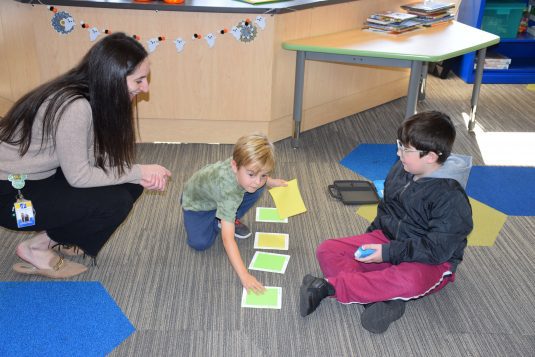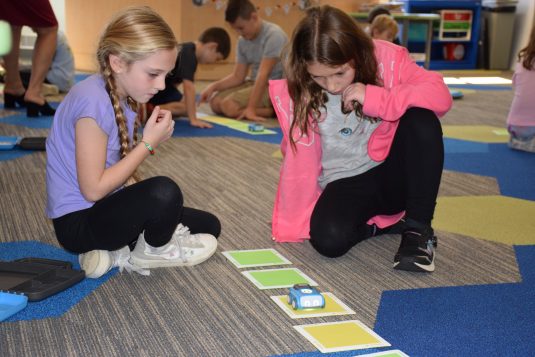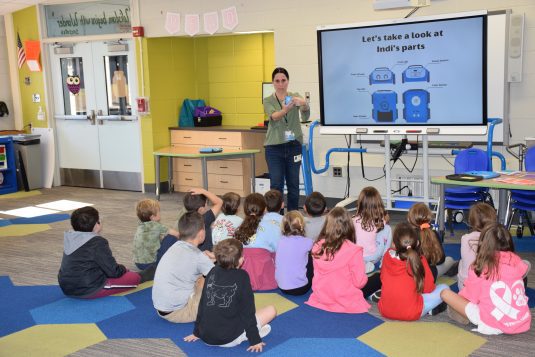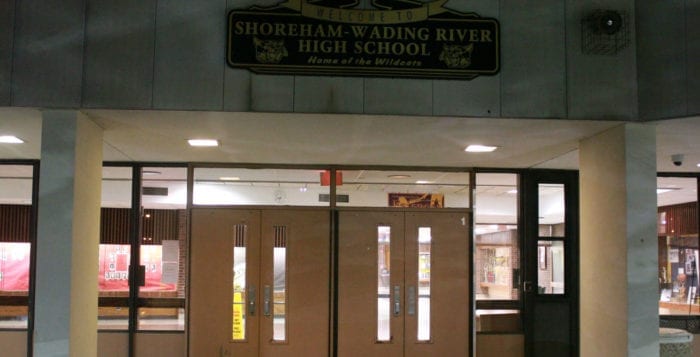Shoreham-Wading River’s third preliminary budget presentation for the 2018-19 school year March 20 included an added proposal to bring a pre-kindergarten program to Miller Avenue School for a total $270,000 in contingency funds. Some residents were on board for the idea, while others wondered if there were better options in how spend the district’s extra dollars.
Superintendent Gerard Poole said the board of education received a request last month to consider the inclusion of the popular program that offers deeper learning and more structured skill-building to young children as a way to better prepare them for success in future education. According to the presentation, the robust program features play-based math curriculum, English language arts, development of fine motor and gross motor skills and a strong emphasis on social-emotional learning.
“This is a really great gift to give to our children. It’ll help them socially, cognitively and emotionally, and also help our district’s enrollment. Families that are young and new are looking for programs like these.”
— Courtney Von Bargen
“Pre-K programming, according to our research, offers benefits to students’ social-emotional learning and academics, and eases the transition to kindergarten,” Poole said. “About half of Long Island districts do offer a pre-K program.”
Administrators estimated that $250,000 would be spent annually to cover the costs of staffing. An additional $20,000 was also set side as a one-time start-up cost for this year. The program requires a total of two teachers with pre-kindergarten certification and two teacher aides.
These funds, they stressed, do not in any way change previously-presented budget numbers — which includes a slight increase of just .95 percent, or $701,500, from the current year’s budget at a total $74,776,072. There’s a projected tax levy decrease in the budget draft of .5034 percent, or $268,775 from the 2017-18 budget.
Pre-kindergarten would occupy two classrooms with a capacity of 72 students and be broken down into two half-day time slots — 9:15-11:30 a.m. for one group and 12:15-2:30 p.m. for the other. Implementation of the program would also potentially boost the district’s declining enrollment.
Brookhaven Town Highway Superintendent voiced his feeling of opposition not as an elected official, but as the father of a student in the district.
“I’m here to urge members of the board to not adopt the pre-K program,” he said. “Fundamentally, this program would reduce options for district parents because the money can be applied elsewhere. It has been proven time and again that when you introduce public funding into a preschool, you reduce the options, and put outward pressure on private providers. Half-day programs will also take students away from other activities.”
“Fundamentally, this program would reduce options for district parents because the money can be applied elsewhere.”
— Dan Losqudro
He read a quote from Lindsey Burke, director of the Center for Education Policy, a national independent advocate for public education and more effective public schools. “Subsidies for early childhood education would produce negative effects … policy makers should recognize it’s unnecessary and provides no new benefit to low-income parents, and will create a new subsidy for middle and upper-income families while adding to the tax burden,” he said.
Wading River mother Robin Heavey also voiced opposition to the proposal, concerned about security issues that may arise from the program. Because the district would not be supplying transportation for pre-K, Heavey wondered how the school will handle the extra parents and children coming in and out of the building.
“What would be the drop-off and pick-up procedure?” Heavey asked. “If we went through the main vestibules at Miller Avenue, 36 families walking through at the same time would cause disruption and difficulty. And also, what about security guards? Will we have to hire an additional guard for drop offs and pickups?”
Alisa McMorris said she would like to see the extra funds go toward enriching and enhancing the district’s existing programs instead.
“We really need to take a good look at how this will affect the entire district, and how it can be utilized somewhere else,” she said.
But Courtney Von Bargen, a former teacher in the Connetquot school district, stood up in support.
Shoreham-Wading River Budget highlights:
- 2018-19 proposed budget 0.95 percent higher than current year — $74,776,072 compared to $74,074,572
- All instructional programs will be maintained, with several additions including Project Adventure and Student Council at Miller Avenue; Science Olympiad and Coding clubs at Wading River School; Christian Club and a cheer team at the middle school; and a yoga club at the high school
- Tax levy decrease of .5034 percent, below the allowable tax levy limit cap over the last six years
- Employee salaries and benefits make up 70.9 percent of the budget’s total expenditures with $33,811,370 projected for salaries and $19,205,941 for benefits
- Superintendent Gerard Poole said: “Our budget is developed to maintain and strengthen our student programs and outcomes and developed to protect the future fiscal health of our residents.”
“Research shows that 3- and 4 year olds that attend high-quality preschools are more successful in kindergarten and beyond,” Von Bargen said. “It really starts with a strong foundation, and if they’re provided with that they will be successful throughout their careers. This is a really great gift to give to our children. It’ll help them socially, cognitively and emotionally, and also help our district’s enrollment. Families that are young and new are looking for programs like these.”
After the meeting, a few more residents weighed in on the issue on a Shoreham-Wading River community page on Facebook.
“So many districts have pre-K programs,” Wading River resident Justine Eve said. “It helps the little ones get acclimated to their building and prepares them well.”
But Stacey Tingo believes the district should have other priorities.
“Let’s meet the needs of all the current students in the district before we bring on new clientele,” Tingo said. “Bring in a full-time elementary librarian, secondary grade psychologist, add another unit to the high school math and science classes … then we can talk about pre-K.”
Board of education member Michael Yannucci addressed many of the concerns of residents.
“We as a nation invest more in academic intervention and not enough in early intervention, where the vast majority of research shows we get more value from,” he said. “Any thought that adding a few pre-K classes would add to security threat is misplaced … we also put many dollars toward enrichment and mental health and current services are regularly evaluated for efficiency. Miller Avenue is the most logical place for [this program]. It’s our early childhood school, has the space and will be the school these children attend for three additional years.”
The next budget meeting will take place Tuesday, March 27, and will focus on: Curriculum & Staff Development, Athletics, Community Programs, Health Services and Personnel — which makes up 1.19 percent of the budget. The public will be able to vote on the budget in May.















